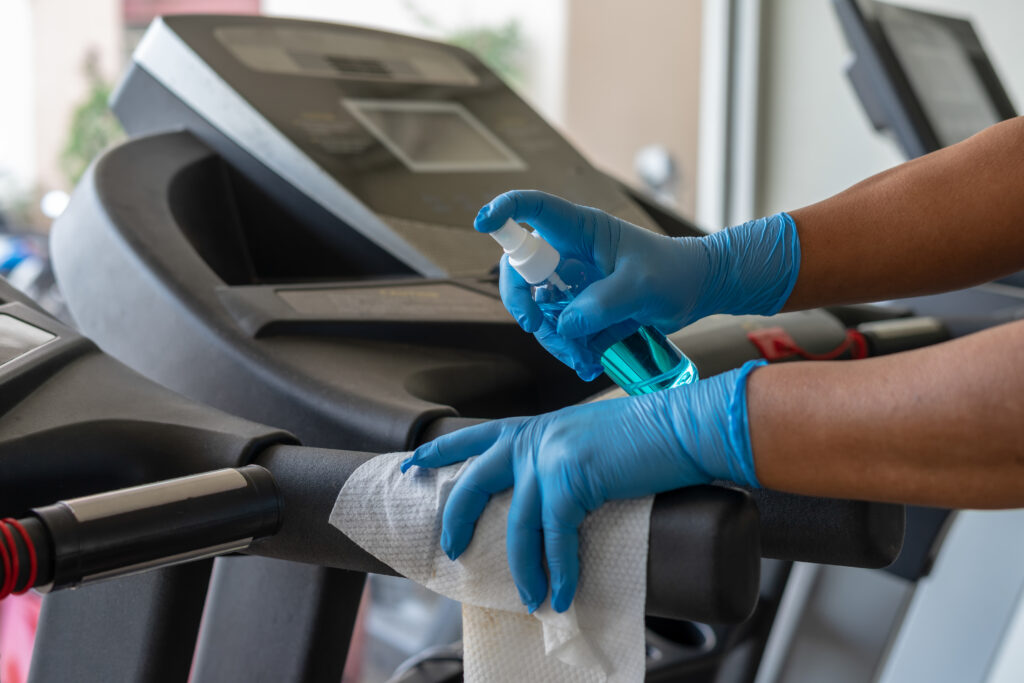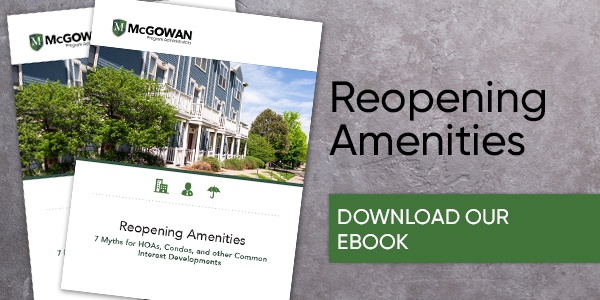With new knowledge and new weapons to fight and treat the COVID-19 virus, the nation is trying a coordinated effort to reopen following a set of established best practices safely. The reopening efforts are similar across many industries and spaces, including HOAs, condos, and community associations. Reopening amenities successfully and safely in all spaces centers around five focus areas: monitoring, assessment, planning, documenting, and protection.
ADMONITION: It is imperative to keep in mind that even using the best practices, and following all governmental guidelines will not create immunity for the association or board members from potential liability. Remember, with few exceptions, there is not insurance to fund any litigation against the association or board members.
1. Monitoring COVID-19 protocols in reopening amenities
First, consider if reopening is even an option. Keep a running list of what’s opening up and when, and the state guidelines to follow. There may not be specific rules outlined about HOA or condo amenities. However, you can look to rules and regulations designed for public facilities like pools, tennis courts, gyms, and other community centers for guidance. For the latest on best practices, look at guidelines from the Center for Disease Control.
2. Assess the amenities
After you’ve determined which amenities are allowed to open, there are two steps to take. First, closely examine the reopening guidelines and decide whether you can meet them without too much cost or risking safety. Particular amenities may reopen, but managing the policies within a specific amenity reopening may not be realistic.
The second thing board members need to do is speak with residents about the amenities allowed to reopen following your state guidelines. If they’re not comfortable using the pool, for example, and wouldn’t use it, then there’s no reason to go through the trouble of reopening it. Make sure to survey residents regularly to get their input on which amenities they’d like to use.
3. Create a reopening plan
After you know what you’d like to reopen, you need to make sure you’ll be able to open safely and meet the guidelines required by your city or state. The best way to move forward is with a written plan. Make sure your list includes the following:
- Communication: Have a plan to regularly and effectively communicate with the community, whether through email, push notifications, or text messages. Communications should include announcing reopenings, guidelines, and alerts if some that tested positive used an amenity. Communicate the steps you’re taking to ensure safety, along with cleaning practices.
- Scheduling Strategy: Reopening amenities will likely happen at reduced capacity. To meet guidelines and maintain order having an advanced scheduling system is ideal. Using a scheduling app is convenient for residents and allows you to track who uses the facilities and when.
- Equipment Considerations: In gym and fitness rooms, make sure equipment is spaced out for social distancing. Set up stations with sanitizing wipes and hand sanitizer and post signage asking residents to wipe down equipment after use. If possible, move fitness classes to outdoor areas.
- Cleaning Schedule: Hire a professional cleaning service to sanitize and disinfect spaces weekly. Create a daily cleaning schedule for staff to follow, ensuring it meets the CDC’s latest guidelines.
4. Document and share the plan
Create a page on the HOA website that layout the reopening plan. Send a notice to all residents through email that links to the page.
The page should include:
- reopening dates
- procedures that residents and staff will follow
- directions on scheduling facility use.
Make it easy for residents to post questions, and make sure to send out all changes immediately.
5. Stay in compliance & mitigate risk
Staying in compliance with guidelines and making a plan that adapts as things change currently the best way to mitigate reopening risks during COVID-19. We are only beginning to learn about the liability risks associated with the virus.
An HOA board’s primary duty is to protect, preserve, and enhance the community association’s assets. Community association insurance is designed to protect individuals who voluntarily serve on association boards of directors, the association, and those who assist.
McGowan Program Administrators is a leading provider of community association insurance products nationwide. We offer a wide selection of products designed to help community associations and HOAs, whether the most severe and unexpected scenarios and common everyday exposures.



